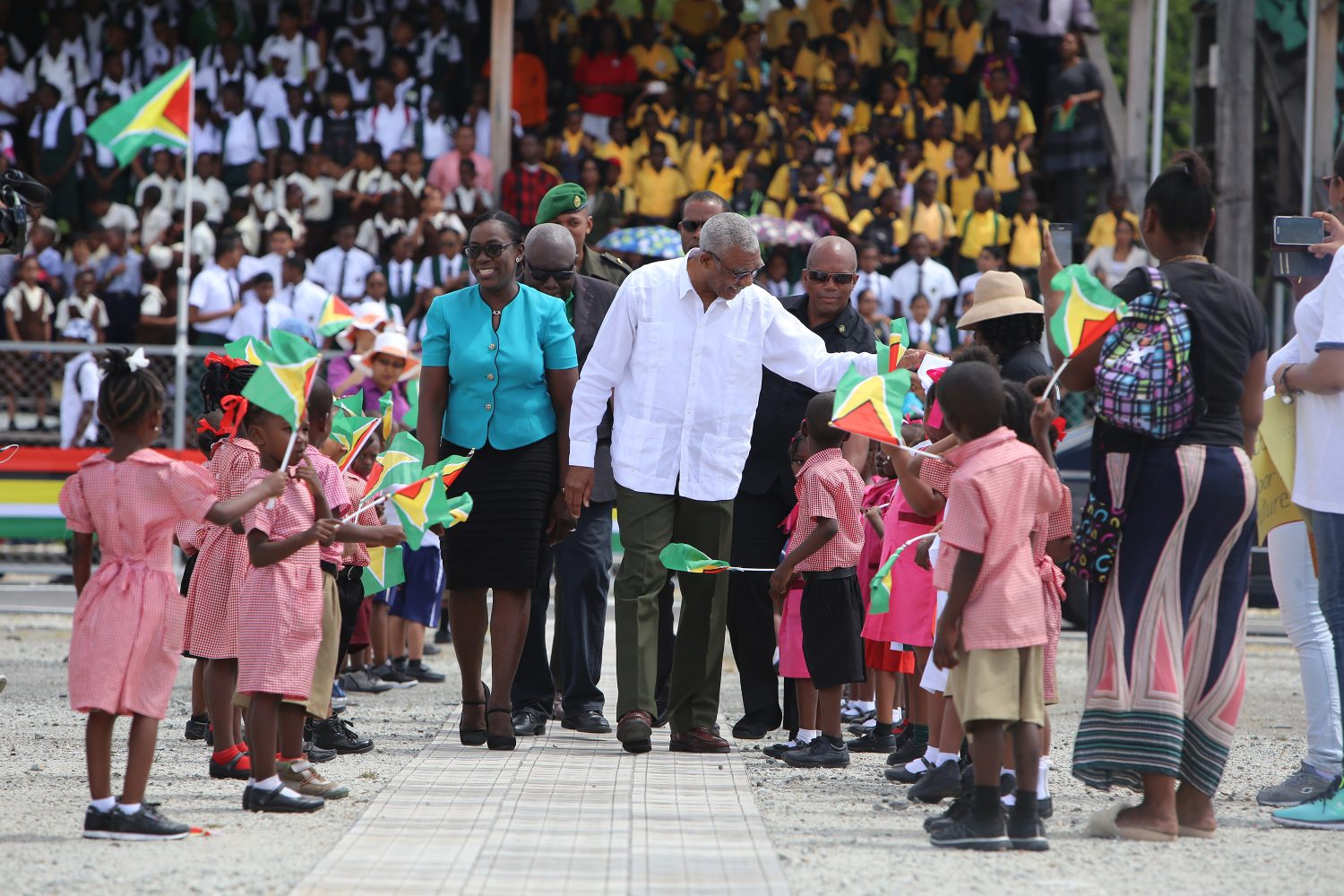President David Granger and Minister of Education Nicolette Henry yesterday pledged continued spending by government on education sector reforms, while arguing that it is money well spent.
They were at the time addressing hundreds at the National Education Day rally and exhibition at D’Urban Park.
At last year’s Education Month rally, Granger had announced that the second Friday in September will be observed as National Education Day.
Speaking at the opening of the exhibition yesterday, he reiterated his government’s commitment to providing universal access to education across the country. He noted that though Guyana has a small population and a small budget, government is committed to working within the limitations of the budget and population size to ensure that education is delivered to the four corners of Guyana.
“Every child must be in school is not just a motto or slogan but a declaration of intent,” Granger stressed.
He added that it is a statement of government’s mission and determination before sharing his expectation that not only central government but also regional administrations, municipalities, communities, families and households could all embrace the notion and policy of every child in school.
According to the head of state, over the last two and a half years his government has been able to refine its attitude to education reform through listening to stakeholders, including students and teachers.
He noted that during the last two months he has visited several education institutions, including the Cyril Potter College of Education, the Kuru Kuru Training College, Queen’s College and President’s College. At each institution, he was able to see what was happening and listen and learn from the complaints and suggestions of students and teachers.
He said this firsthand engagement has reinforced the idea that children wherever they live must have access to school.
“If they can’t get to school, the school must get to them. We have an obligation to make sure every child gets to school; there must be more schools, more staff, more libraries, and more laboratories. Schools and the entire education system, expensive as they are, are not liabilities, they are assets and we will continue to spend because spending money on education is money well spent,” he told those gathered.
Granger further explained that his government is working to achieve universal access to education both through the provision of transportation under the Buses, Boats, Bicycles, Books and Breakfast (Five Bs) programme and through the newly conceived Department for Education System Innovation and Reform (DESIR).
According to the President, DESIR will improve the delivery of education through innovation.
“DESIR is a reality within the Ministry of Education. Innovation will lead to improvement, nothing stands still. There must be more computers in schools, every school must have Wi-Fi and we are working towards that…I don’t want to hear of a student in Wismar or Anna Regina who cannot go to class at Tain or Turkeyen, because we will, through technology, provide distance education,” he explained before also stressing that that until the education system is providing for the special needs of Guyanese children, it is not sufficient.
The question of quality education was further addressed by Henry, who explained that government is presently optimistic about the impact of reforms to be implemented this year, especially after the improvements noted last year.
Declaring that education is clearly an area where money makes a difference, Henry noted that during the last academic year new things were tried and vast sums were spent, resulting in some improvement.
“We are focusing on quality education for every child and a good school for every family. That may sound basic, but it’s absolutely fundamental to creating an improved education system, helping every child fulfil their potential and helping to make Guyana a place where anyone who works hard can get ahead,” she noted, while stressing that government must therefore be innovative.
Additionally, she said the ministry must work to reduce the disparity in education, by making sure all schools are working to the same high standard, while improving the quality of education, with continued, revised teaching methods and embracing the enhancement of technology in the classroom.
“The government has, as a principal objective of its public policy to strengthen the administration of the ten regions and to improve the delivery of education and other public services, as part of that policy, there will be the establishing of regional technical institutes to provide access to technical education for a greater number of the country’s young people,” Henry explained.
Meanwhile, Chief Education Officer (CEO) Marcel Hutson said the ministry’s efforts are based on the belief that quality education does not only enlighten but also empowers citizens, and enables them to contribute, to the maximum extent possible, to the social and economic development of their communities. “We believe that we are on the verge of a magnificent turnaround in our education sector. However, a union of the school, home and community is critical to the development and sustainability to this process,” he said.
According to the CEO, administrators are cognisant of the special attention that must be given to schools in the hinterland, in particular, with a view of closing the gap in performance between such schools and those on the coast.
“Our progress as a nation can be no swifter than our progress in education, and the human mind is our fundamental resource. It is imperative that as a nation we provide every opportunity for the expansion and growth of this fundamental resource that will promote the development of our communities and by extension our nation,” he stressed.









